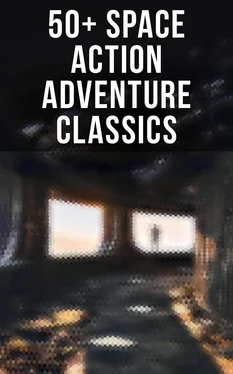H. G. Wells, Stanley G. Weinbaum, Jules Verne, Otis Adelbert Kline, Edgar Wallace, Percy Greg, David Lindsay, Edward Everett Hale, Malcolm Jameson
50+ Space Action Adventure Classics
Intergalactic Wars, Alien Attacks & Sci-Fi Novels: The War of the Worlds, Across the Zodiac…
Published by

Books
- Advanced Digital Solutions & High-Quality eBook Formatting -
musaicumbooks@okpublishing.info
2018 OK Publishing
ISBN 978-80-272-4827-8
H. G. Wells H. G. Wells Table of Contents
The War of the Worlds
The Shape of Things to Come
In the Days of the Comet
The War in the Air
The Chronic Argonauts
Otis Adelbert Kline
The Venus Trilogy
The Planet of Peril
The Prince of Peril
The Port of Peril
The Mars Series
The Swordsman of Mars
The Outlaws of Mars
Other Novels
Maza of the Moon
The Metal Monster
Stranger from Smallness
Edgar Wallace
Planetoid 127
Stanley G. Weinbaum
Stories from the Solar System:
A Martian Odyssey (Mars)
Valley of Dreams (Mars)
Flight on Titan (Titan)
Parasite Planet (Venus)
The Lotus Eaters (Venus)
The Planet of Doubt (Uranus)
The Red Peri (Pluto)
The Mad Moon (Io)
Redemption Cairn (Europa)
Malcolm Jameson
Captain Bullard Series
Admiral's Inspection
White Mutiny
Blockade Runner
Bullard Reflects
Devil's Powder
Slacker's Paradise
Brimstone Bill
The Bureaucrat
Orders
Jules Verne
From the Earth to the Moon
Around the Moon
Off on a Comet
Percy Greg
Across the Zodiac
David Lindsay
A Voyage to Arcturus
Edward Everett Hale
The Brick Moon
Table of Contents
Table of Contents
Book One. The Coming of the Martians
Chapter One. The Eve of the War
Chapter Two. The Falling Star
Chapter Three. On Horsell Common
Chapter Four. The Cylinder Opens
Chapter Five. The HeatRay
Chapter Six. The HeatRay in the Chobham Road
Chapter Seven. How I Reached Home
Chapter Eight. Friday Night
Chapter Nine. The Fighting Begins
Chapter Ten. In the Storm
Chapter Eleven. At the Window
Chapter Twelve. What I Saw of the Destruction
Chapter Thirteen. How I Fell in with the Curate
Chapter Fourteen. In London
Chapter Fifteen. What Had Happened in Surrey
Chapter Sixteen. The Exodus from London
Chapter Seventeen. The “Thunder Child”
Book Two. The Earth Under the Martians
Chapter One. Under Foot
Chapter Two. What We Saw from the Ruined House
Chapter Three. The Days of Imprisonment
Chapter Four. The Death of the Curate
Chapter Five. The Stillness
Chapter Six. The Work of Fifteen Days
Chapter Seven. The Man on Putney Hill
Chapter Eight. Dead London
Chapter Nine. Wreckage
Chapter Ten. The Epilogue
Book One.
The Coming of the Martians
Table of Contents
Chapter One.
The Eve of the War
Table of Contents
No one would have believed in the last years of the nineteenth century that this world was being watched keenly and closely by intelligences greater than man’s and yet as mortal as his own; that as men busied themselves about their various concerns they were scrutinised and studied, perhaps almost as narrowly as a man with a microscope might scrutinise the transient creatures that swarm and multiply in a drop of water. With infinite complacency men went to and fro over this globe about their little affairs, serene in their assurance of their empire over matter. It is possible that the infusoria under the microscope do the same. No one gave a thought to the older worlds of space as sources of human danger, or thought of them only to dismiss the idea of life upon them as impossible or improbable. It is curious to recall some of the mental habits of those departed days. At most terrestrial men fancied there might be other men upon Mars, perhaps inferior to themselves and ready to welcome a missionary enterprise. Yet across the gulf of space, minds that are to our minds as ours are to those of the beasts that perish, intellects vast and cool and unsympathetic, regarded this earth with envious eyes, and slowly and surely drew their plans against us. And early in the twentieth century came the great disillusionment.
The planet Mars, I scarcely need remind the reader, revolves about the sun at a mean distance of 140,000,000 miles, and the light and heat it receives from the sun is barely half of that received by this world. It must be, if the nebular hypothesis has any truth, older than our world; and long before this earth ceased to be molten, life upon its surface must have begun its course. The fact that it is scarcely one seventh of the volume of the earth must have accelerated its cooling to the temperature at which life could begin. It has air and water and all that is necessary for the support of animated existence.
Yet so vain is man, and so blinded by his vanity, that no writer, up to the very end of the nineteenth century, expressed any idea that intelligent life might have developed there far, or indeed at all, beyond its earthly level. Nor was it generally understood that since Mars is older than our earth, with scarcely a quarter of the superficial area and remoter from the sun, it necessarily follows that it is not only more distant from time’s beginning but nearer its end.
The secular cooling that must someday overtake our planet has already gone far indeed with our neighbour. Its physical condition is still largely a mystery, but we know now that even in its equatorial region the midday temperature barely approaches that of our coldest winter. Its air is much more attenuated than ours, its oceans have shrunk until they cover but a third of its surface, and as its slow seasons change huge snowcaps gather and melt about either pole and periodically inundate its temperate zones. That last stage of exhaustion, which to us is still incredibly remote, has become a presentday problem for the inhabitants of Mars. The immediate pressure of necessity has brightened their intellects, enlarged their powers, and hardened their hearts. And looking across space with instruments, and intelligences such as we have scarcely dreamed of, they see, at its nearest distance only 35,000,000 of miles sunward of them, a morning star of hope, our own warmer planet, green with vegetation and grey with water, with a cloudy atmosphere eloquent of fertility, with glimpses through its drifting cloud wisps of broad stretches of populous country and narrow, navy-crowded seas.
And we men, the creatures who inhabit this earth, must be to them at least as alien and lowly as are the monkeys and lemurs to us. The intellectual side of man already admits that life is an incessant struggle for existence, and it would seem that this too is the belief of the minds upon Mars. Their world is far gone in its cooling and this world is still crowded with life, but crowded only with what they regard as inferior animals. To carry warfare sunward is, indeed, their only escape from the destruction that, generation after generation, creeps upon them.
Читать дальше












